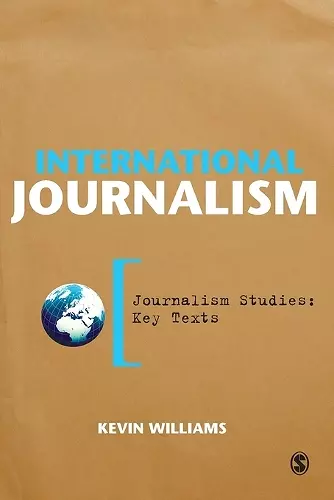International Journalism
The evolution and future of foreign correspondence
Format:Paperback
Publisher:SAGE Publications Inc
Published:10th Aug '11
Currently unavailable, and unfortunately no date known when it will be back
This paperback is available in another edition too:
- Hardback£132.00(9781412945271)

This insightful book examines the evolution and challenges of foreign correspondence, shedding light on the future of international journalism.
In International Journalism, Kevin Williams provides a thorough and engaging analysis of the evolution of foreign correspondence and international journalism. This book serves as a comprehensive resource, meticulously sourced and contextualized, shedding light on the significant role that news agencies have played in shaping the profession over the last two centuries. Williams emphasizes that the roots of foreign correspondence are deeply intertwined with historical themes of imperialism, post-colonialism, and commercialization, which continue to influence the field today.
The author raises critical questions about the future of foreign correspondents in an increasingly globalized world. By tracing the historical development of international reporting, International Journalism explores the organizational structures and occupational cultures that define this field. Williams argues that despite the challenges posed by new media and changing commercial landscapes, foreign correspondence is not necessarily destined for extinction but is evolving in response to these pressures.
Through a detailed examination of three global models of reporting—Anglo-American, European, and those from the developing world—Williams uncovers the complexities of how journalism is practiced and understood today. This book is essential reading for journalism students and anyone interested in the core issues of reporting in a global context, offering a timely and thought-provoking perspective on the state of international journalism.
Kevin Williams has authored an account of "foreign" correspondence and international journalism that is the most comprehensively-sourced, inclusive, contextualized, timely and critical in its field. At last, we have an account that acknowledges that the largest employers of "foreign" correspondents for nearly two hundred years have been and continue to be the news agencies; that the occupation is rooted in a history of imperialism, post-colonialism and commercialization, whose vestiges today are all too apparent; that the impacts of so-called "new media" on the amount, range and quality of international news, while significant, are less dramatic and less positive than commonly supposed
Oliver Boyd-Barrett, PhD
Professor of Journalism, Bowling Green State University, Ohio
With the clarity of a searchlight, the sharpness of a razorblade and an unusual ability to focus on the essential, Professor Williams′ book on international journalism provides a foundation from which further debate on global journalism can take place. In outlining the many paradoxes between the global wave in journalism and the demise of the autonomous foreign correspondent, the book provides a setting for anyone interested in the globalization paradoxes
Hans-Henrik Holm
Jean Monnet Professor, Danish School of Media and Journalism
So how will this change the international journalism of the future? Williams possesses no crystal ball but he does have a sound analytical brain and plenty of solid research. His opening chapters give a clear and detailed explanation of the way international journalism works. This covers everything the student, novice or experienced, needs to understand how the news is brought from foreign lands. There are also detailed discussions about the meaning and purpose of foreign news as well as explanations of why foreign news is becoming less important in domestic media
Journalism Education
ISBN: 9781412945288
Dimensions: unknown
Weight: 330g
216 pages